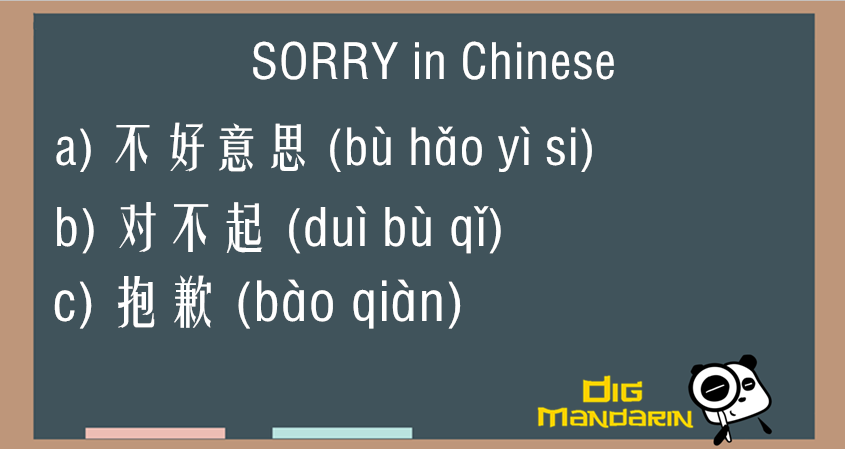“对不起” is surely one of the first words you will learn when studying Chinese, and for good reason. It literally means “sorry” in Chinese, and it is certainly a word you will use many times no matter what language you are speaking. But, depending on the situation, do you know that in Chinese there are several ways to express “sorry”? Here are some other ways to say sorry in Chinese:
a) 不好意思 (bù hǎo yì si)
不好意思 is used as a milder way to say “sorry” in Chinese. This phrase is used particularly in situations where you feel some sort of embarrassment. Additionally, this phrase can also mean “excuse me”, especially when you are disturbing someone and trying to get their attention.
e.g.
A:我喜欢你!(Wǒ xǐhuān nǐ!)
I like you!
B:不好意思,我有男朋友了。(Bù hǎo yìsi, wǒ yǒu nán péngyǒule.)
Sorry, I have a boyfriend already.
不好意思,请让一下。(Bù hǎo yìsi, qǐng ràng yīxià.)
Excuse me, would you mind stepping aside?
不好意思,发生了什么? (Bù hǎo yìsi, fāshēng le shénme?)
Excuse me, what happened here?
b) 对不起 (duì bù qǐ)
As mentioned earlier, 对不起 literally means “sorry”. It`s a formal and straightforward way to admit your mistakes and to apologize for them. It`s definitely a necessary word to know.
e.g.
A:你今天迟到了。( míngměi, nǐ jīntiān chídàole)
You are late today.
B:对不起,路上堵车了。(Duìbùqǐ, lù shàng dǔchē le.)
Sorry, there was a traffic jam.
对不起,你的文件被我不小心删除了。(Duìbùqǐ, nǐ de wénjiàn bèi wǒ bù xiǎoxīn shānchú le.)
Sorry, your file was deleted by me accidentally.
对不起,我帮不了你。(Duìbùqǐ, wǒ bāng bù liǎo nǐ.)
Sorry, I can`t help you.
c) 抱歉 (bào qiàn)
When you feel guilty about something, you use 抱歉. It means “to apologize” in English. This word is particularly used when you feel sorry about something bad that happened to others, and you wish to to express your regret.
e.g.
A:你还没来吗?(Nǐ hái méi lái ma?)
Have not you come yet?
B:抱歉,我今天不能来了。(Bàoqiàn, wǒ jīn tiān bù néng lái le.)
Sorry, I cannot come today.
对于你离婚的事,我感到很抱歉。(Duìyú nǐ líhūn de shì, wǒ gǎndào hěn bàoqiàn.)
I`m sorry about your divorce.
How to refuse something the Chinese way
Unlike English, Chinese is a high-context language.. In a higher-context culture, many things are left unsaid, letting the context explain itself. Thus, there are situations when Chinese is not as direct as English. The affirmative or negative expressions may therefore include speech and body language. I think that`s why the saying “嘴上说不,身体却很诚实 (“saying NO with the mouth, but the body is very honest”) is so popular on the internet. You need to determine and be aware if the answer really shows a person’s true intention. It could be that Chinese people are just trying to be polite when they actually mean something else. Thus, reading Chinese people`s body language and attitude is very important. Below are several possible negative feedbacks, , but remember to READ AND UNDERSTAND THE CONTEXT in which they are being said. One could say that these are ways of saying “No” without being too direct or straightforward about it.
a) 下次吧 (xià cì ba)
A:我们一起看电影吧!(Wǒmen yī qǐ kàn diànyǐng ba!)
Let`s watch a movie together!
B:下次吧。我今天不太舒服。(Xià cì ba. Wǒ jīntiān bù tài shūfú.)
Next time. I`m not feeling very well today.
b) 改天吧 (Gǎitiān ba)
A:你有空吗?我想和你聊一聊。(Nǐ yǒu kòng ma? Wǒ xiǎng hé nǐ liáo yī liáo.)
Are you available? I want to have a talk with you.
B:改天吧。(Gǎitiān ba.)
Maybe another day.
c) 我想一想 (Wǒ xiǎng yī xiǎng)
A:这件衣服很适合你,买一件吧!(Zhè jiàn yīfú hěn shìhé nǐ, mǎi yī jiàn ba!)
This piece of clothing is very suitable for you. Buy one!
B:我想一想吧。(Wǒ xiǎng yī xiǎng ba.)
Let me think about it.



This Post Has 0 Comments